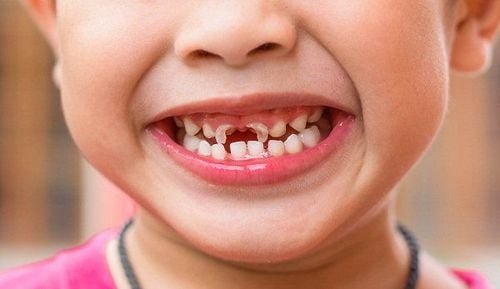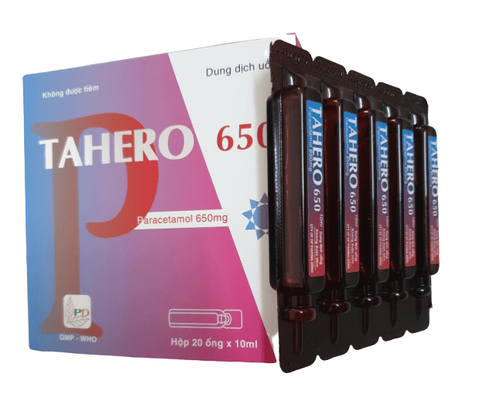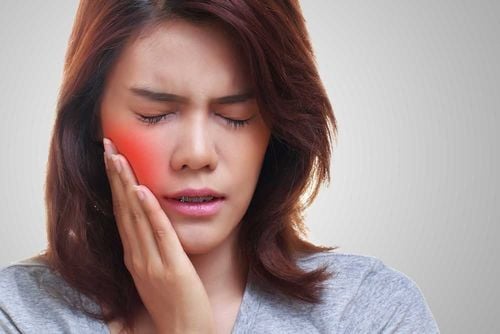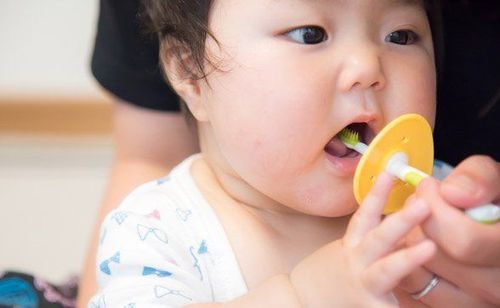This is an automatically translated article.
Start taking care of your baby's gums even before teething. Wipe your baby's gums after each feed with a warm, wet washcloth or a damp gauze wrapped around your finger.
1. Clean baby's gums before teething
Need to take care of the gums for babies when teething, even before the baby's first tooth comes in, you should get into the habit of wiping the gums with gauze or a wet soft towel while bathing. You don't need to use any toothpaste yet. Simply wrap a cloth or gauze around your index finger and gently rub it on your gums.
Bacteria in the mouth usually can't harm the gums before the teeth erupt, but it's difficult to know when the teeth will start pushing through, so you'll want to start early. Getting your child used to cleaning their mouth as part of their daily routine will make the transition to a brushing routine easier later on as well.

Khi trẻ mọc răng, việc chăm sóc nướu cần được chú trọng
2. The best way to brush children's teeth after they start puberty.
When your baby's teeth start to erupt (usually around 6 months) taking care of baby teeth, experts recommend starting brushing with a little fluoride toothpaste. Here's how: Brush twice a day, in the morning and right before bed. Use a children's toothbrush with a small head and a handle that fits your hand. Use a small amount of fluoride toothpaste. Squeeze a little fluoride toothpaste or dab a grain-sized amount on the brush (Note that many toothpastes marketed for babies do not contain fluoride). Gently brush the inside and outside of each baby's teeth, as well as his or her tongue (if you want) to dislodge bacteria that can cause bad breath. Since you are using such a small amount of toothpaste, there is no need to rinse again.
Replace the toothbrush as soon as the bristles start to wear out or come off. By now, your baby's teeth will be far enough apart that you won't have to worry about flossing. In fact, there's no evidence that flossing makes a difference. Most dentists recommend that you start flossing when the surfaces of your teeth are touching and you can't clean them with a toothbrush.
3. What is the appropriate dose of fluoride?
Fluoride helps prevent tooth decay by strengthening tooth enamel and making it resistant to acids and harmful bacteria.
But while a little fluoride is a good thing for a child's teeth, too much can lead to a condition called fluorosis, which causes white spots to appear on your child's adult teeth. This is why it is important to use only a small amount of toothpaste until your child is old enough to rinse and spit it out.
When babies are 6 months old, they should also get a certain amount of fluoride from drinking water or water used to make formula. If your water doesn't contain enough fluoride, your child may need a fluoride supplement.
Note: In general, water should not be given to babies until they are about 6 months old. Until then, your baby will get all the water he needs from breast milk or formula, even in hot weather. Read more about how to get kids to drink water.
If the water you use to make baby formula contains fluoride, your baby will get fluoride from bottle feeding. Most municipal water supplies are fortified with enough fluoride.
If the fluoride level is less than 0.3 parts per million ask your child's doctor or dentist if you should give your child a fluoride supplement. Your doctor may prescribe fluoride in the form of drops that you can add to your baby's bottle or cereal once a day. Experts do not recommend fluoride supplements for infants under 6 months of age.

Trẻ cần được sử dụng hoàn toàn sữa mẹ khi ở 6 tháng đầu đời
4. When should you start taking your baby to the dentist?
Dentists recommend taking care of your child's teeth, taking your child to see the dentist within six months of the baby's first tooth erupts or before the baby's first birthday, whichever come before. Meanwhile, at each baby's checkup, your baby's primary health care provider should look at your baby's teeth (if they have them) and possibly apply fluoride varnish every three to six months, depending on your baby's teeth. Depends on your baby's risk of tooth decay.
Risk factors include a family history of tooth decay and poor oral health in the mother during pregnancy. When you take your child to the dentist, be sure to tell them about the fluoride treatments your child has received at the doctor's office.
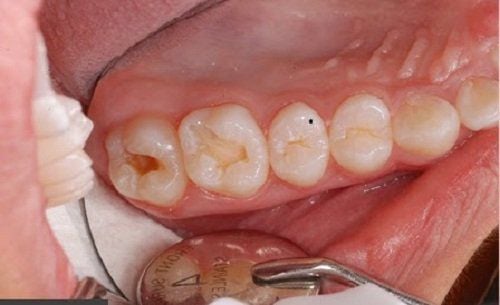
Trẻ cũng cần được đưa đi khám răng nếu gia đình có tiền sử sâu răng
5. Certain foods can cause tooth decay in babies.
These foods can contribute to tooth decay: fresh fruit, dried fruit, juices, peanut butter.... Eat these foods with water so they break down easily and don't stick to your teeth. too long. Do not put your child to bed with a bottle of milk, juice, or sweetened liquids. These fluids feed bacteria in the mouth that cause tooth decay.
For children to be healthy and develop well, it is necessary to have a nutritious diet in terms of quantity and quality balance. If children are not provided with adequate and balanced nutrients, it will lead to diseases of excess or lack of nutrients, which adversely affect the comprehensive development of children in terms of physical, mental and motor skills.
Parents should supplement their children with supportive products containing lysine, essential micro-minerals and vitamins such as zinc, chromium, selenium, and B vitamins to help fully meet their child's nutritional needs. At the same time, these essential vitamins also support digestion, enhance nutrient absorption, help improve anorexia, and help children eat well.
Parents can learn more:
Signs of zinc deficiency in children
Micronutrient deficiency and failure to gain weight in children
Please regularly visit Vinmec.com website and update useful information to take care of your child. Take care of the baby and the whole family.




